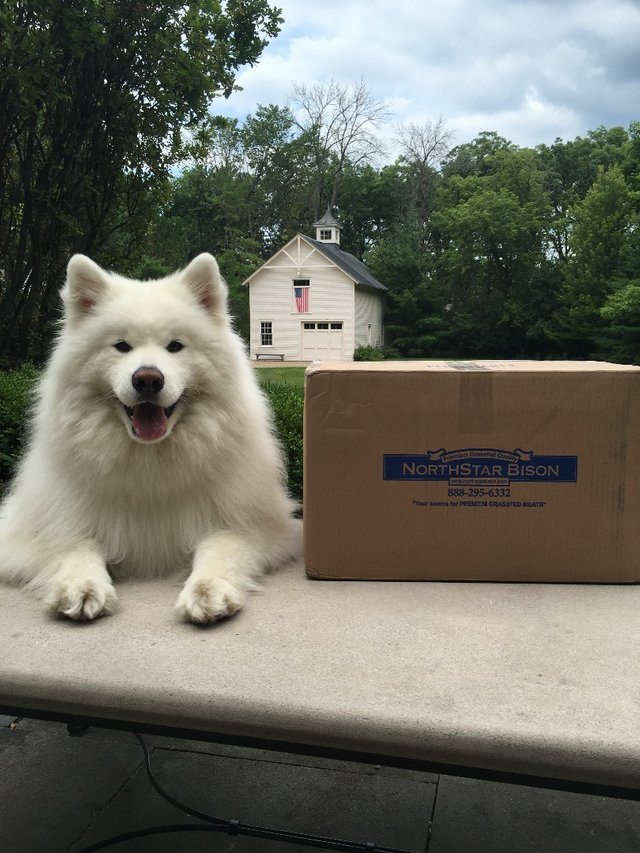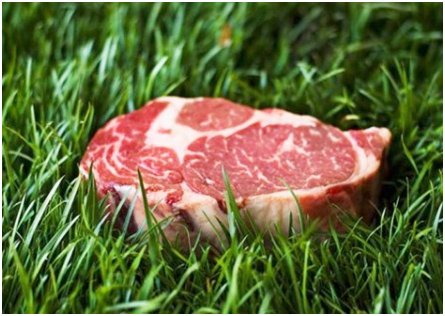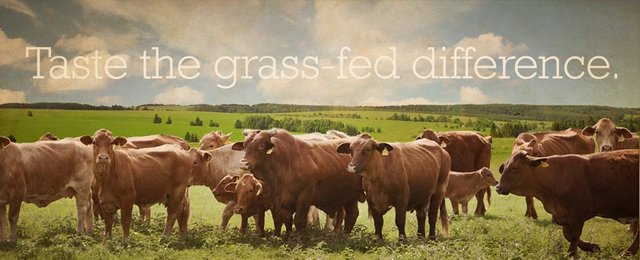Why Steemians Should Choose Grass-Fed Beef

FAT is an essential nutrient of the human diet. Some fats can provide numerous health benefits, while others can promote disease. Beef is loaded with high quality fats when the cow is raised on grass for its entire life.
What exactly do you mean by Grass-Fed?
Ruminant animals, such as cows, bison, and lamb have been naturally selected by evolution to consume grass as their primary food source. While humans are not capable of extracting energy from grass as they lack certain digestive enzymes, these animals are healthiest when they get to graze on lush pastures filled with green grass. Grass fed is a term that refers to the feeding practices established by the farmer. In essence, the animal gets to live and eat grass for the majority of its life. See grass fed vs. grass finished.
Is the beef I am buying at the grocery store grass-fed?
Chances are, probably not. It is easy to spot grass-fed beef as there is always a “grass-fed” label on the package. USDA prime cuts are not grass-fed.
If the meat I am buying is not grass-fed, then what is the animal being fed?
Most of the time it is grains, such barley, wheat, and corn, but factory farms have been known to feed their animals chicken feathers, city garbage, and even animal by-products. I believe a lot of people are aware of the disturbing nature of factory farms, so I will not go into that topic in this post. If you want to read more about the truths of factory farms, click here
Does it really make a difference if the animal is fed grass vs. grain?

To many people’s surprise, the answer is yes! Allowing ruminant animals to live on pastures and consume grass throughout their entire lives produces not only happier and healthier animals, but more nutritious meat. Grass-fed beef has been proven to have considerably higher levels of essential fats, fat-soluble vitamins, antioxidants, and minerals. Check out these two studies done by researchers that show the differences of beef based off how the cows were fed:
Effects of conventional and grass-feeding systems on the nutrient composition of beef.
Both studies concluded that grass-fed beef was higher in essential omega 3 fatty acids, CLA, fat-soluble vitamins, carotenoids, antioxidants, and minerals.
Moving away from SAD
One of the most important biomarkers for your health is your omega-6 to omega-3 fatty acid ratio. It is commonly recommended by nutritionists and doctors to be about 2:1, and 1:1 if you are experiencing inflammation. This is nowhere close to most American’s dietary intake. The majority of Americans have a ratio of 20:1 to 30:1! Why is that? Corn, corn oil, canola oil, and soy are common foods Americans eat everyday that contain high levels of omega 6 fatty acids. Consuming grass-fed beef will move you from this highly inflammatory state to a much healthier way of life.
Pricing
Grass-fed beef is almost always more expensive. However, there are simple tricks you can do to pay less for this higher quality beef. Pretty much every farm will apply a discount to each pound of beef if you buy it in bulk. My recommendation is to find another friend or two that eats beef and purchase a bulk order, then split it up evenly. This way you are putting highly nutritious food into your body at a reasonable price, while not supporting factory farms. Some of favorite my places to order grass fed beef from are:

Stay tuned for more biohacks and health optimization advice!
Cheers,
Charles and Oliver
INSTAGRAM: BioWealth
SNAPCHAT: BioWealth 👻
#nutrition #grassfed #grassfedbeef #health #biohacking #fitness #energy #wellness #animalwelfare
Man, that top picture could sell my wife anything. What a spectacular beast. CSA's seem to be the way to go for grass fed beef, at least where I live.
Haha, thanks. Yes, CSA's are great choice for people who live close to local farms or local farm deliveries.
Yes! Glad to have another real-food proponent here on Steemit. As my husband @lukestokes mentioned, we have been in a meat CSA for the last many years (6?) to get grass-fed/pastured meats, and we love it. I wrote a blogpost awhile back on healthy fats--a summary of a book I read called Eat Fat, Lose Fat. In case you're interested, I've also posted a few times here on Steemit about real food, including this post which talks about meat CSAs, among other things, being a way to save money on good healthy food. Welcome to Steemit!
"real food"
Come off your high horse man.
To clarify, when I say "real food," I mean a spectrum. In the most general sense, though, I mean fruits, vegetables, meat, fish, nuts, etc that do not have food additives, conditioners, colorings, flavorings, preservatives, anti-caking agents, MSG, high fructose corn syrup, partially hydrogenated oils, etc. Not trying to be snooty, so sorry if I came off that way.
HF corn syrup is just diabolical, fair enough!
Great post! My wife got us into a CSA (community supported agriculture) with grass fed and pastured meat. We love it. We also get "not for human consumption" raw milk (thanks, government) and grass fed butter, both of which are amazing. The whole "fat is bad!" movement, I think, did so much to lower human health. Bring on the healthy fats!
To clarify....The raw (grass-fed) milk we buy here has to be labeled "not for human consumption" because it is illegal to sell raw milk for human consumption here in Tennessee.
@lukestokes thank you. I couldn't agree more with you. My family and I consume grass fed beef, lamb, bison, and raw grass fed milk quite regularly. These foods are not only super nutritious, but so tasty.
Is there really a "fat is bad" movement? There's a high-carb/low-fat movement (the 80-10-10 diet, Doug Graham, Freelee the banana girl, etc.), but none of these people say fat is bad, just that it should be a lower ratio of your diet than what people usually eat today.
It's kind of like you can say the US should cut down on military spending without saying it doesn't need defense. It just doesn't need THAT much.
And the other part of the equation is they advocate eating a bunch more calories than most people usually eat. So even if they're advocating a low proportion of fat, it doesn't mean the total amount of fat is necessarily that low. And they're certainly not denying that there are healthy fats or advocating that you don't get any.
Perhaps there is a different movement actually saying fat is bad, I'm not sure :p
It was more of an advertising thing, from what little I understand. Products sold better if they had "0% Fat!" on the label because some people we're confused about healthy fats. I'd have to ask @corinnestokes for more details, but from what I remember reading, the cultural idea that fats were unhealthy did spread to a number of people (which is why advertisers responded as they did, to get that purchasing power) which, ultimately, hurt people's health. It also relates to the cholesterol discussion which pushed out healthly fats as well. This isn't my area of understanding, so I'm worse than an armchair quarter back here.
Gotcha. Ya, I'm pretty sure whole milk is better for you than skim (I don't drink either anymore), but through marketing people have it in their head that skim is better.
I'm always skeptical of like "reduced fat" potato chips. I just won't eat potato chips if I'm concerned about fat today, lol. It seems like there has to be some tradeoff of making things more artificial.. I'd rather take the fat and keep it closer to the whole food.
Well....generally speaking, fat has been demonized here in the US. People/government have pointed the finger at fat for causing heart disease and obesity....hence the marketing push to label things as low-fat/no-fat. But fat is not bad, and not all fats are equal. There are healthy fats and non-healthy fats. Partially hydrogenated fats and canola oil, for example, are not so great for you. But butter (especially made from milk from cows that are grass-fed) and coconut oil have lots of health benefits. For some great nutritional reading, check out a book called Nourishing Traditions.
Mmmm grass fed beeeef....
You can definitely taste a difference. Happy cows just taste better!
Grass-Fed Biltong is one step up, money wise, but certainly worth it to your health.
While I get that this might be hot and 'trendy' to talk about, please give people the important quotes before having them run off to buy the next fad in the meat industry.
"Although the fatty acid composition of grass-fed and conventionally fed beef was different, conclusions on the possible effects of these differences on human health cannot be made without further investigation."
From the study you link: http://www.ncbi.nlm.nih.gov/pubmed/18641180
Layman terms: It might be beneficial, but we're not sure and haven't researched it enough. But it sure as heck is a lot more expensive in the grocery stores.
This study was completed in 2008. There have been hundreds of studies done since then that show omega 3 fatty acid and fat-soluble vitamin consumption is directly correlated with better human health. In terms of pricing, you can purchase grass-fed beef in bulk that will save you quite a bit of money.
I wish I could afford some grass fed beef. Do you have a recommendation of the next best thing?
You can get grass-fed beef at a cheaper price by buying in bulk as mentioned in the post. This might mean buying a 1/4 of a cow to put in your freezer. (You'd need an extra freezer for that.) You can also do a meat CSA (community-supported agriculture) program through a local farm. We are part of a meat CSA and we get 20-22 pounds of grass-fed/pastured meat per month at a discounted price. Ours is beef and chicken, but there are lots of variations on these kinds of programs. Google "CSA" for your city and see what you can find. You can also get good healthy fats from grass-fed butter (like Kerrygold butter) and coconut oil. Wild-caught fish is also really good for you.
nice!
Congratulations @biowealth! You received a personal award!
You can view your badges on your Steem Board and compare to others on the Steem Ranking
Vote for @Steemitboard as a witness to get one more award and increased upvotes!
I don't eat beef at all, but I prefer grass fed butter and give my sons and husband grass fed beef when they want it. It was neat to read what you had to say on the issue! Thanks for sharing your educated insights!